#a trauma about inferiority or being a half-being isn't inherent to the experience of being 'of two worlds' at all
Explore tagged Tumblr posts
Note
do you have any particular thoughts regarding marcille being a half-elf? its interesting to me considering the fact that she seems self-conscious about being a half-elf, but denies it when its brought up
i remember marcille looking visibly uncomfortable over laios simply asking her how old she is, which i think the only reason she might feel nervous about this is because it might reveal her as a half-elf to him.
she's never corrected anybody whose called her an elf either.
never mind the circumstances of the reveal, in which thistle goes on about how half-elves are inferior and accusing her of wanting to become full blooded elf, she seemed particularly upset like he struck a nerve-
i wish the half-elf thing was built upon more. also, underrated marcille line:
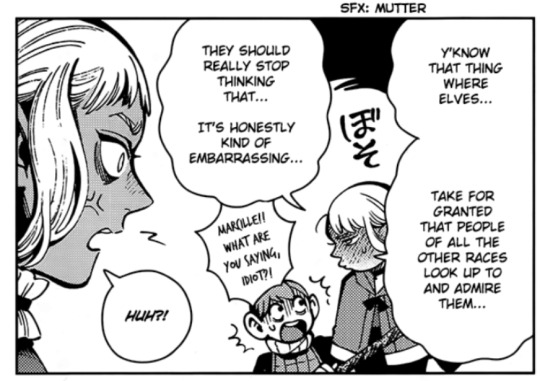
okay so i revisited this sequence just to make sure I could back myself up and it's just... man. there's a lot going on.
the first reaction we get from Marcille is this huge panel that takes up half of the page
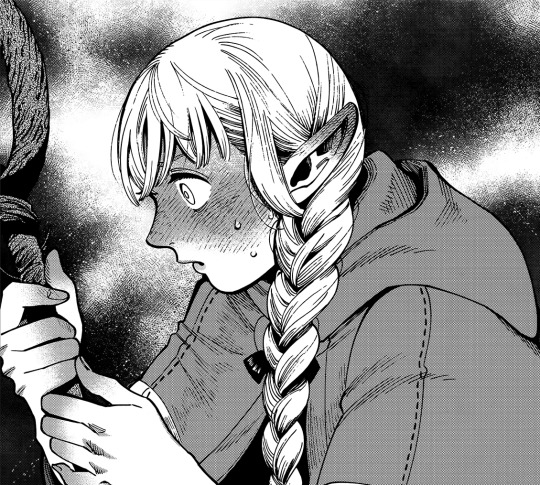
she is viscerally affected. flushing to the tips of her ears with the intensity of it. and we see it again, a few pages later
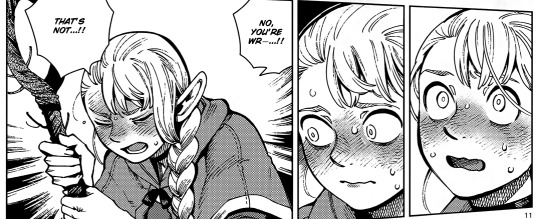
so it might seem like she's embarrassed about it and lying to herself, but... I really think it's just that Thistle is accidentally hitting sore spots. If you really look at what he says to get these reactions
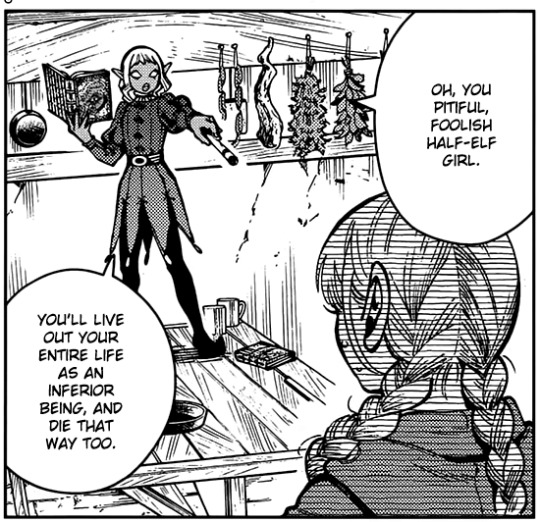
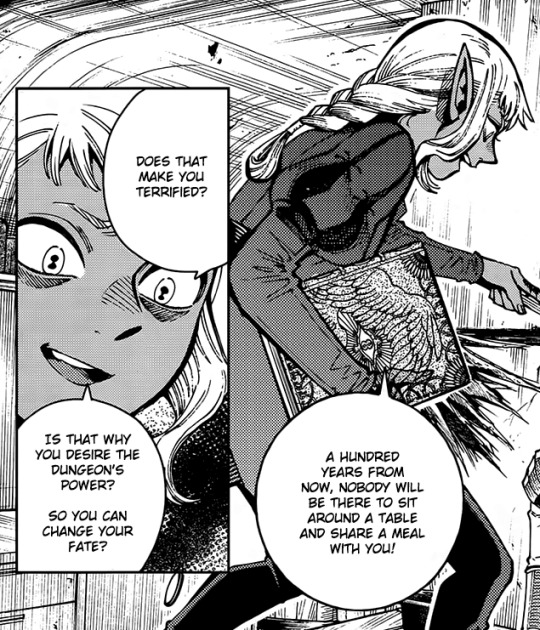
"you'll live out your entire life [...] and die that way too"
"a hundred years from now, nobody will be there"
Hear me out. I think, if he stuck to harping on about her inferiority without bringing up how terrifyingly long-lived she is, she wouldn't have been as bothered. But right now, Thistle is accidentally hitting all the marks on Marcille's deepest fears-- and this is after the Winged Lion promised her that her dreams could come true in an extremely vulnerable moment, so it also hits her slightly guilty conscience as well.
I do truly believe that Marcille isn't bothered about being a half-elf the way that people assume she'd be bothered by it. To her, the biggest problem with being a half-elf is that it's isolating.
On one hand, it's not hard to imagine why she'd distance herself from elves in the west. A lot of them can clock her as a half-elf on sight, unlike other races, and therefore she's always branded with this weird stigma of being Othered -- I would even say that she considers herself lucky for being born outside of elven culture instead of having to grow up in it. I mean, just... look at the way elves talk about her.
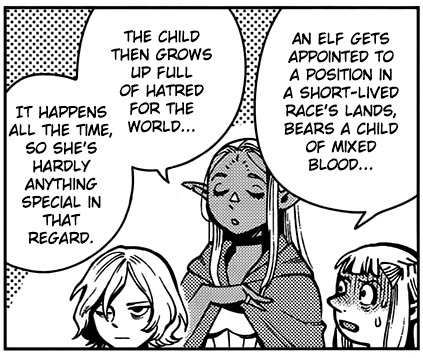

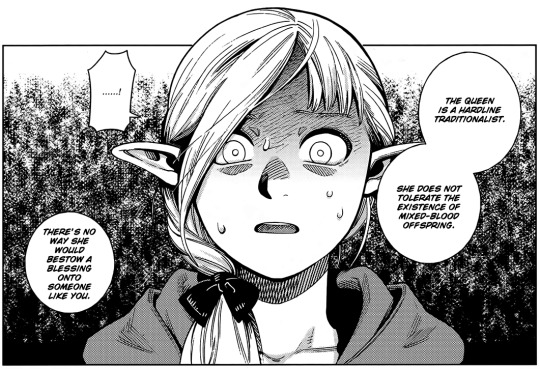
Skipping past the uncomfortable implication of what 'not tolerating the existence' of half-elves would actually entail, this is incredibly fucking annoying. You can see why she wouldn't want to be around elves much. You see a lot of Marcille reacting badly here, but honestly, almost all of it can be attributed to her freaking out that her bluff completely failed. She's honestly more paying attention to Izutsumi's footsteps and trying to coordinate an opportunity to escape.
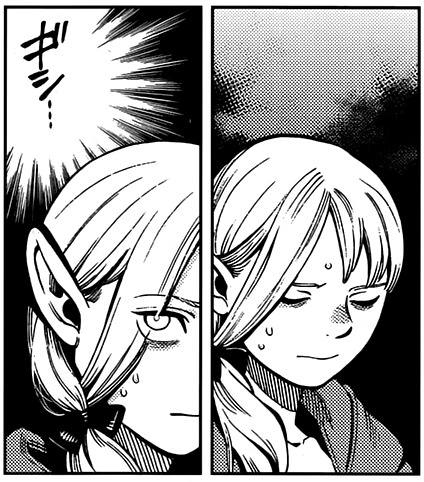
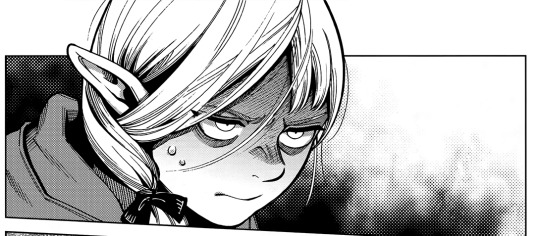
And in the end, you see her built-up frustration at being asked if she wants to be a full-blooded elf like 2-3 times in a row.
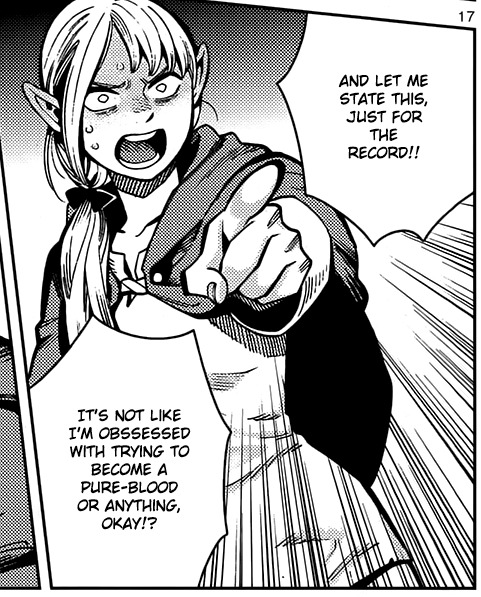
Yeah, yeah, "the lady doth protest too much," and all. But we know Marcille. We know that she's a lot more embarrassed and horrendously unconvincing when she's being prodded about something she's actually self-conscious about.
Moving onto the flipside of things, it might seem weird that she "pretends" to be a full elf around other races, but it's not really that strange if you think about it. Again, people are weird about her being infertile or whatever, and a lots of them don't even know much about what sets half-elves apart from everyone else. I mean, look at how uncomfortable Laios is just asking her about it
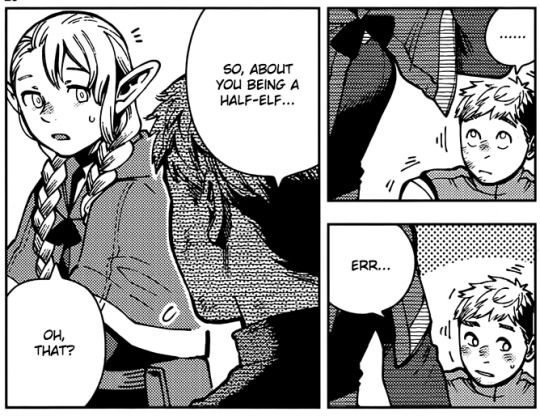
and look at how exasperated and resigned she looks
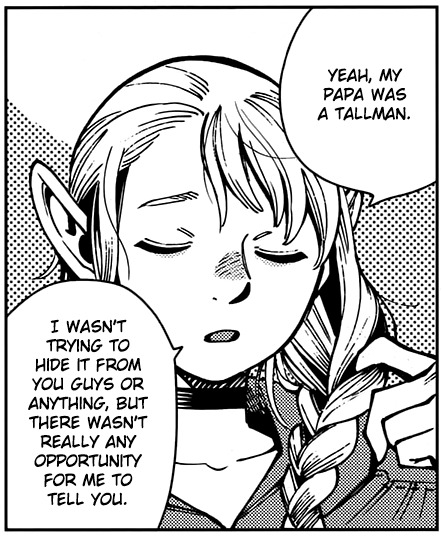
And like... she's right. Where would that come up in normal conversation? Why would she go out of her way to tell them? She's functionally a normal elf to other races anyway -- got the ears, the abnormally long "childhood", and the huge mana capacity. Unless it's directly relevant or important for people to know, I don't think it's all that strange or indicative of insecurity that she prefers not to bother with it.
(This combined with her sense of being an "outsider" to elf culture also explains why she thinks elf superiority is embarrassing. She sees the way elves treat short-lived races from the "outsider" perspective nonetheless, and thinks it's obnoxious; especially more so because she usually has to play the elf around short-lived races and deal with the reputation of arrogance that elves have built up.)
The sad thing is, this all means that... she doesn't actually fit in anywhere. She doesn't like going out West much because of how elves treat her. But she's also an outsider in the continents she was born in, treated like this exotic long-lived alien choosing to live among short-lived races for some reason. She is always an outsider, the Other, no matter where she goes. Add in the fact that she'll live longer than literally anyone she knows, and it's honestly kind of heartbreaking.
And I think that's the crux of it. Marcille really doesn't act like she's at all self-conscious about being a half-elf because of any feelings of inferiority or being half-made or whatever. She considers herself a perfectly legitimate being and might even, in some ways, consider herself superior to normal elves because she's not blind with elf supremacy or whatever. (And whatever "elven biases" she displays, all of them are born more out of the fact that she's kind of bad at conceptualizing how other races age and mature compared to herself, not that she actually considers herself better or more mature simply for being an elf.)
I think that whatever self-consciousness Marcille has about being a half-elf is, instead, related to terror and loneliness. The reminder that it ensures she'll never truly belong anywhere for the rest of her very long life. The reminder that, in truth, even she's not actually sure how old she is by other races' standards (hence the discomfort when asked how old she is). She doesn't want to not be a half elf, or be a full elf or full tall-man-- in her ideal world, she's still a half-elf. She just gets to live out her life at the same pace with the people she loves and doesn't have to say goodbye again and again and again until she dies.
and one last very important panel, right after Mithrun tells her that all her desires would be devoured
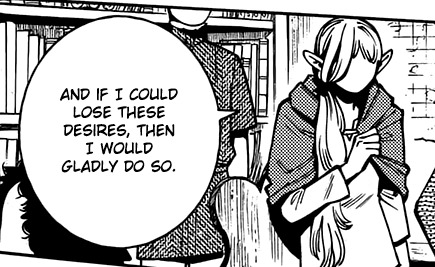
In her ideal world, she's still a half-elf and reality magically starts marching at her pace. But failing that, the second best thing is that she's still a half-elf-- but one who is able to accept reality and let go of her fear.
(But the rest of the story pans out the way it does because, to Marcille, taking reality apart and reshaping it was less scary than simply and fully reconciling with it.)
#asks#dungeon meshi manga spoilers#marcille donato#manga panel analysis#this is probably riddled with typos sorry#readmore cut bc it got long lmao#i ended up babbling about it bc it's such an important character detail to me#bc like... wow. she's so normal about it. she's literally just chilling.#the only thing that really bothers her is the material reality of it and how people treat her#the stereotypes the stigma etc. etc.#otherwise it just..#literally doesn't factor into her criteria for self-worth at all#the basic truth is that marcille likes herself on a fundamental level#she's not plagued by a deep and festering self-loathing the way a lot of characters in her archetype are#she likes herself and is proud of her successes and accomplishments#its just that shes terrified of failure and can have *episodes* of self-loathing when she fucks up#but who doesn't yknow#i know its a very slight nuance that makes very little difference in how her 'overachiever' problems manifest but its there#the sword of abandonment issues that hangs over her head has nothing to do with her self-worth or self-esteem or meeting her own standards#it has to do with the fear of not living up to *other* people's expectations and not being useful enough to be worth keeping around#she's good enough for herself but she's always so so so scared that she's not good enough for other people#i wont say much about what ryoko kui is saying using this as an allegory for real world racial biases but#dungeon meshi's treatment of marcille's relationship with her being half-elf is so incredibly important to me because it gets it so right.#a trauma about inferiority or being a half-being isn't inherent to the experience of being 'of two worlds' at all#that's something that's unfairly drilled into people by their environment#the *inherent* anguish is the loneliness. the constant longing. the fact that you are always homesick no matter where you are#always just a little bit of an outsider and never fully at home#and dungeon meshi gets that.#edit: cleaned it up a little
123 notes
·
View notes
Text
Transformers EarthSpark Season 2 Spoilers
If I had to describe S2A in one word, it would be: Disappointing.
Others have said this before me, but if you were a fan of S1 this most definitely isn't the show for you anymore.
S2A is so far inferior to S1 in every conceivable way. The animation, the characters, the story, it all just feels so half-assed. Every single interesting concept S1 introduced, S2A either mangled beyond belief or flat-out erased from existence.
The few new interesting things that do come up in S2A don't last long and/or are underdeveloped.
Tensions between humans and Cybertronians? Never mentioned. All the racism died with Mandroid and GHOST, I guess.
The Terrans' connection to Quintus Prime? Pfft, you're still on that? It's all about the Quintessons now, keep up nerd!
Starscream's development and start on the road to recovery from trauma? Gone. He's back to being the villain now for no reason whatsoever. He murders two actual children. What, did you think we were still doing that silly nuance thing from S1? Lol, sucks to be you.
The ongoing theme about the Transformer War not being as black and white as history would have people believe? Ummm, ackshually, the Decepticons are inherently evil and irredeemable. The Autobots are saints and have never done anything wrong or questionable, ever. Ignore the prison complex from last season that performed unethical experiments on prisoners of war. Y'know that same one that the Autobots knew about and supplied with Decepticon prisoners.
Spitfire and Aftermath are interesting in theory, but S2A doesn't really do anything with them besides making them the generic Evil Twin characters to Twitch and Jawbreaker respectively. And then Starscream murders them for his evil masterplan, which feels like a colossal waste.
I've been saying since S1 that it would be interesting to have a Terran actually choose the Decepticons over both the Autobots and the Maltos. It would've been a neat way to explore the family dynamic the 'Cons have compared to the Maltos and maybe show that just because a family is different from yours, maybe not as physically affectionate or as instantly harmonious, doesn't mean it's worse. We had a good start with Aftermath and Breakdown but that never really goes anywhere before Starscream does a Fuck Them Kids.
The Decepticons are just evil again now. Great. I guess we're completely throwing the "history isn't black-and-white" thing out of the window, huh? That whole thing where it was implied the Decepticons were rising up against an unjust system a la Aligned continuity and IDW? We kind of had a very significant confrontation between Megatron and Shockwave about that in that one episode that even explicitly referenced IDW? Or how about the whole "This is not freedom" plot line about how mayyybe throwing every Decepticon in the slammer forever might be, just might be, bad? We had a whole episode about that? Soundwave was in it?
Nah, 'Cons are unambiguously evil. Always. Especially that no-good Starscream. "What Dwells Within" and "The Last Hope, Part 2" might as well have never happened, because Starscream sure as hell doesn't act like they did. He barely even interacts with Hashtag. "Come on, did you expect Starscream to be a good guy now?" No bitch, I expected believable character development. I find it hard to believe that the same Starscream who saved Hashtag from the Cybertronian equivalent of a vampire, at risk to his own life, and then told her to take care of herself as a good-bye would just suddenly go back to the same moustache-twirling evilness we'd be expecting from G1 Starscream. You expect me to buy that this guy is the same Starscream as the one who showed up with the entire cavalry to save the world in the S1 finale?? Why go through the trouble of giving Starscream an entire episode going into his trauma and abuse and learning to be better if this is all it amounts to in the end??? At least show us how it happened? What made Starscream suddenly completely regress like that??? I don't know and the way it's going I don't think EarthSpark is all that interested in explaining it.
The Maltos remain a criminally underdeveloped hive mind. And no, I don't consider adding even more powers to their arsenal character development. Robbie and Mo still don't have any friends outside of their siblings and this season did nothing to change my mind on the cybersleeve connection being borderline creepy and making the characters co-dependent. "The Butterfly Effect" basically showed us all the reasons why having your siblings in your head 24/7 with no way to turn it off would actually suck. Cybersynching is so obviously combining with a new coat of paint and it's not even used or utilized that much in this batch.
We did not need the Quintessons in this season. At all. They added nothing except implying that Quintus Prime is shady af. Which, we been knew? The whole of "Prime Time" is literally Quintus torturing a little girl for being upset her big brother is sick and probably dying. If you wanted to explore Quintus through one of his creations seeing him in a much less benevolent light, well, how do I put this? There were two whole new characters added this season you could've done this with. Aftermath and Spitfire not being in the "We Love Quintus Prime" club together with the rest of the Terrans would make sense, since they're far more rebellious and anti-authoritarian. That would've given them something interesting to do besides being minor nuisances to the Delightful Maltos from Down the Lane.
I've heard that EarthSpark isn't doing well both in ratings and in toy sales and after that first batch I can see why.
The show is not all bad, but legit none of these characters are developed enough or distinct enough that I could see a kid wanting a toy of them. And that goes double for older fans.
The writers messed up big time and I honestly don't know if I'm gonna stay and see if they fix it in S2B.
47 notes
·
View notes
Text
The reason dating is so miserable isn't them — it's you
Gleb Leonov/Strelka Institute/Flickr
Childhood interactions with parents and family leave imprints on the unconscious and become a map of how people experience intimacy.
As a result, we seek out romantic interests the unconscious believes will resolve whatever unfulfilled emotional needs we had as a child.
People often disassociate their emotions from intimacy as a coping mechanism — but this isn't a long-term solution.
To find more emotionally satisfying and healthy relationships, you have to confront your insecurities head on, and be upfront about them to the people you're dating.
When you think about it, despite feeling difficult, the problems people struggle with in dating sound pretty trivial.
For instance, we have been walking and talking our entire lives, yet walking up to an attractive person and opening our mouths to say "hi" can feel impossibly complex to us. People have been using a phone since they were children, yet given the agony some go through just to dial a person's phone number, you'd think they were being waterboarded. Most of us have kissed someone before and we've seen hundreds of movies and instances in real life of other people kissing, yet we still stare dreamily into the object of our affection's eyes hour after hour, telling ourselves we can never find the "right moment" to do it.
Why? It sounds simple, but why is it so hard?
We build businesses, write novels, scale mountains, help strangers and friends alike through difficult times, tackle the thorniest of the world's social ills — and yet, when we come face-to-face with someone we find attractive, our hearts race and our minds are sent reeling. And we stall.
Dating advice often compares improving one's dating life to improving at some practical skill, such as playing piano or learning a foreign language. Sure, there are some overlapping principles, but it's hard to imagine most people trembling with anxiety every time they sit in front of the keyboard. And I've never met someone who became depressed for a week after failing to conjugate a verb correctly. They're not the same.
Generally speaking, if someone practices piano daily for two years, they will eventually become quite competent at it. Yet many people spend most of their lives with one romantic failure after another.
Why?
What is it about this one area of life that the most basic actions can feel impossible, that repetitive behavior often leads to little or no change, and that our psychological defense mechanisms run rampant trying to convince us to not pursue what we want?
Why dating and not, say, skiing? Or even our careers? Why is it that a person can conquer the corporate ladder, become a militant CEO, demanding and receiving the respect and admiration of hundreds of brilliant minds, and then flounder through a simple dinner date with a beautiful stranger?
Our emotional maps
As children, none of us get 100% of our needs met. This is true of you. It's true of me. It's true of everyone. The degree of which our needs aren't met varies widely, and the nature of how our needs are unfulfilled differs as well. But it's the sad truth about growing up: We've all got baggage. And some of us have a lot of it. Whether it is a parent who didn't hold us enough, who didn't feed us regularly enough, a father who wasn't around often, a mother who left us and moved away, being forced to move from school to school as a child and never having friends — all of these experiences leave their mark as a series of micro-traumas that shape and define us.
Dina Uretski/Shutterstock.com
The nature and depth of these traumas imprint themselves onto our unconscious and become the map of how we experience love, intimacy and sex throughout our lives.
If mom was over-protective and dad was never around, that will form part of our map for love and intimacy. If we were manipulated or tormented by our siblings and peers, that will imprint itself as part of our self-image. If mom was an alcoholic and dad was screwing around with other women, it will stay with us. If our first girlfriend/boyfriend died in a car accident or dad beat us because he caught us masturbating — well, you get the point. These imprints will not only affect, but define, all of our future romantic and sexual relationships as adults.
You and I and everyone else have met hundreds, if not thousands, of people. Out of those thousands, multiple hundreds easily met our physical criteria for a mate. Yet out of those hundreds, we fall in love with a very few. Only a handful we meet in our entire lives ever grab us on that gut-level, where we lose all rationality and control and lay awake at night thinking about them.
It's often not the one we expected to fall for either. One might be perfect on paper. Another potential lover might have a great sense of humor and they're amazing in bed. But sometimes there's the one we can't stop thinking about, the one we involuntarily keep going back to over and over and over again.
Psychologists believe that romantic love occurs when our unconscious becomes exposed to someone who matches the archetype of parental love we experienced growing up, someone whose behavior matches our emotional map for intimacy. Our unconscious is always seeking to return to the unconditional nurturing we received as children, and to re-process and heal the traumas we suffered.
In short, our unconscious is wired to seek out romantic interests who it believes will fulfill our unfulfilled emotional needs, to fill in the gaps of the love and nurturing we missed out on as kids. This is why the people we fall in love with almost always resemble our parents on an emotional level.
Hence why people who are madly in love say to each other, "you complete me," or refer to each other as their "better half." It's also why couples in the throes of new love often act like children around one another. Their unconscious mind can't differentiate between the love they're receiving from their girlfriend/boyfriend and the love they once received as a child from their parents.
This is also why dating and relationships are so painful and difficult for so many of us, particularly if we had strained familial relationships growing up. Unlike playing the piano or learning a language, our dating and sex lives are inextricably bound to our emotional needs, and when we get into potentially intimate or sexual situations, these experiences rub up against our prior traumas causing us anxiety, neuroticism, stress and pain.
Flickr/Wheeler Cowperthwaite
So that someone rejecting you isn't just rejecting you — instead, to your unconscious, you're reliving every time your mother rejected you or turned down your need for affection.
That irrational fear you feel when it comes time to take your clothes off in front of someone new isn't just the nervousness of the moment, but every time you were punished for sexual thoughts or feelings growing up.
Don't believe me? Think about this. Someone no-shows for a regular business meeting with you. How do you feel? Annoyed likely. Maybe a tad disrespected. But chances are you get over it quickly, and by the time you get home and are watching TV, you don't even remember it even happened.
Now, imagine someone you are extremely attracted to no-shows for a date. How do you feel? If you're like most people who struggle in this area of their life, you feel like sh--. Like you just got used and led on and sh-- on.
Why? Because being flaked on rubs up against your unconscious fear of abandonment, fear that nobody loves you and that you're going to be alone forever. Ouch.
Maybe you freak out and call them and leave angry voicemails. Maybe you continue to call them weeks or months later, getting blown off over and over again, feeling worse and worse each time. Or maybe you just get depressed and mope about it on Facebook or some dating forum.
Every irrational fear, emotional outburst, or insecurity you have in your dating life is an imprint on your emotional map from your relationships growing up.
It's why you're terrified to go for the first kiss. It's why you freeze up when it comes time to introduce yourself to someone you don't know or tell someone you just met how you feel about them. It's why you clam up every time you go to bed with someone new or you freeze and get uncomfortable when it's time to open up and share yourself with somebody.
The list goes on and on.
All of these issues have deep-seated roots in your unconscious, your unfulfilled emotional needs and traumas.
Disassociating from our emotions
A common way we bypass dealing with the emotional stress involved in dating is by disassociating our emotions from intimacy and sex. If we shut off our need for intimacy and connection, then our sexual actions no longer rub up against our emotional maps and we can greatly diminish the neediness and anxiety we once felt while still reaping the superficial benefits. It takes time and practice, but once disassociated from our emotions, we can enjoy the sex and validation of dating without concerns for intimacy, connection, and in some cases, ethics.
Strelka Institute for Media, Architecture and Design/Flickr
Here are common ways we disassociate dating from their emotions:
Objectification. Objectifying someone is when you see them only for a specific purpose and don't see them as fully integrated human beings. You can objectify people as sex objects, professional work objects, social objects, or none of the above. You might objectify someone for sex, status or influence. But objectification is ultimately disastrous for one's own emotional health, not to mention one's relationships.
Sexism. Viewing the other sex as inferior or inherently evil/inept is a sure way to redirect one's emotional problems outward onto a population at large rather than dealing with them yourself. Without fail, men who treat and view women as some inferior "other," are more often than not projecting their own anger and insecurities onto the women they meet rather than dealing with them. The same goes for women.
Manipulation and games. By engaging in games and manipulation, we withhold our true intentions and identities, and therefore we withhold our emotional maps as well. With these tactics, the aim is to get someone to fall for the perception we create rather than who we really are, greatly reducing the risk of digging up the buried emotional scars of past relationships.
Overuse of humor, teasing, bantering. A classic strategy of distraction. Not that jokes or teasing are always bad, but an interaction of nothing but jokes and teasing is a means to communicate without saying anything important, to enjoy yourselves without actually do anything, and to feel like you know each other without actually knowing a thing. This is most typical of English-speaking cultures — men and women, straight and gay — as they tend to use sarcasm and teasing as a means to imply affection rather than actually showing it.
Strip clubs, prostitution, pornography. A way to experience one's sexuality vicariously through an empty, idealized vessel, whether it's on a screen, a stage, or running you $100 an hour.
Generally, the more resentment one is harboring, the more one objectifies others. People who had turbulent relationships with their parents, or were abandoned in a previous relationship, or tormented and teased when growing up — these people will likely find it much easier and more enticing to objectify and measure their sex lives than to confront their demons and overcome their emotional scars with the people they become involved with.
Most of us have, at one point or another, disassociated our emotions and objectified someone (or entire groups of people) for whatever reasons. I will say, however, that there's a lot of social pressure on men, particularly straight men, to ignore their emotions, particularly "weak" emotions such as a need for intimacy and love. It's more socially acceptable for men to objectify their sex lives and boast about it. Whether you think that's right or wrong or doesn't matter, it is how it is.
Confronting your issues and winning
Disassociating from your emotional needs is the easy way out. It requires only external effort and some superficial beliefs. Working through your issues and resolving them requires far more blood, sweat, and tears. Most people aren't willing to dig deep and put in the effort, but it yields far greater and more permanent results.
Zohra Bensemra/Reuters
1. The biggest misconception when it comes to working through an excess of emotional baggage is that these feelings ever completely go away.
Studies indicate that fears, anxieties, traumas, etc. are imprinted on our brains in similar ways that our physical habits are.1 Just like you've developed a habit of brushing your teeth every time you wake up, you have emotional habits of getting sad or angry any time you feel abandoned or unwanted.
The way to change is not by removing these feelings or anxieties altogether, but rather consciously replacing them with higher order behaviors and feelings.
This can only be accomplished through taking action. There is no other way. You cannot rewire your responses in healthy ways and confront your insecurities if you aren't out there actively pushing up against them. Trying to do so is like trying to learn how to shoot free throws left-handed without ever actually touching a basketball. It just doesn't work.
If you have a habit of flipping out and leaving angry voicemails every time someone doesn't call you back, you don't get rid of the anger, but rather channel that anger into a better and healthier activity, like say, going to the gym, or painting a picture, or punching a punching bag.
2. Anxieties can be overcome through utilizing implementation intentions and progressive desensitization.
For instance, if you get nervous in social situations and have a hard time meeting new people, take baby steps to start engaging in more social interactions. Practice saying hello to a few strangers until it becomes comfortable. Then maybe ask some random people how their day is going after you say hello. Then try to start some conversations with people throughout your day — at the gym, at the park, at work, or wherever. Then, challenge yourself to do these same things with people you find attractive.
The key is to do it incrementally. Setting the stakes too high, too early will just reinforce your anxiety when you fail to meet your lofty expectations. Again, baby steps.
I have entire online courses that deal with meeting and connecting with new people.
Obviously this takes time and requires consistently facing situations which make you uncomfortable, but that's the idea. You must overlay old emotional habits of fear and anxiety with healthier ones like excitement and assertiveness. Mentally train yourself so that any time you feel anxiety, you force yourself to do it anyway.
3. The final step — once you've learned to channel your negative emotions in constructive ways, once you've eaten away at your anxieties and are able to often act despite them — is to come clean with people you date about your needs and start screening based on them.
For instance, I've always had a fear of commitment and needed a woman who was comfortable giving me space and some freedom. Not only do I openly share this with women I get involved with now, but I actively screen for women with these traits.
Ultimately, your emotional needs will only be fully met in a loving and conscious relationship with someone who you can trust and work together with – and not just your emotional issues, but hers as well. We unconsciously seek out romantic partners in order to fulfill our unfulfilled childhood needs, and to do so cannot be completely done alone.
This is the reason that honesty and vulnerability are so powerful for creating high-quality interactions – the practice of being upfront about your desires and flaws will naturally screen for those who best suit you and connect with you.
This kind of authenticity changes the whole dynamic of dating. Instead of chasing and pursuing or wishing and hoping, you focus on consistently improving yourself and presenting that self to the beautiful strangers of the world. The right ones will pay attention and stay. And whether you spend a night or a year with them, this enhanced level of intimacy and mutual vulnerability will help heal your emotional wounds, help you become more confident and secure in your relationships and ultimately, overcome much of the pain and stress of that accompanies sex and intimacy.
An invitation for change
I invite you to take some time and think about what your emotional hang ups are in this area of your life, where they probably come from, and how you could overcome them in an open and honest way.
As an example, I grew up in a broken family where all members isolated themselves and we seldom communicated our emotions. As a result, I became highly sensitive to confrontation and any negative emotions of others. I became the consummate Nice Guy and for years struggled to assert myself in my relationships and around women. In fact, I objectified my sex life quite a bit and adopted some narcissistic behaviors in order to push me through some of these insecurities.
My fear of commitment is undoubtedly rooted in my parents' divorce, and my knee jerk reaction for years was to run away any time a woman attempted to get close to me. I slowly eroded that fear by opening myself up to intimate opportunities little by little over a long period of time. I was incapable of becoming intimate with a woman unless I had an escape route (i.e., she had a boyfriend, or I was going to move to another city soon, etc.).
Spending all of my adolescence living alone with my mother has made me particularly sensitive to female affection, and like a smoker rationalizing reasons to smoke one last cigarette, I have often rationalized myself into intimate and sexual situations with women who I perhaps should not have been with or didn't actually like as much as I thought I did.
This is my emotional map — at least part of it. These are the hang ups and issues that I've battled and slowly beaten back with years of active effort. These are the realities that I express openly and seek out the proper women who can handle them.
What are yours?
NOW WATCH: The disturbing reason some people turn red when they drink alcohol
from Feedburner http://ift.tt/2zGasDu
0 notes